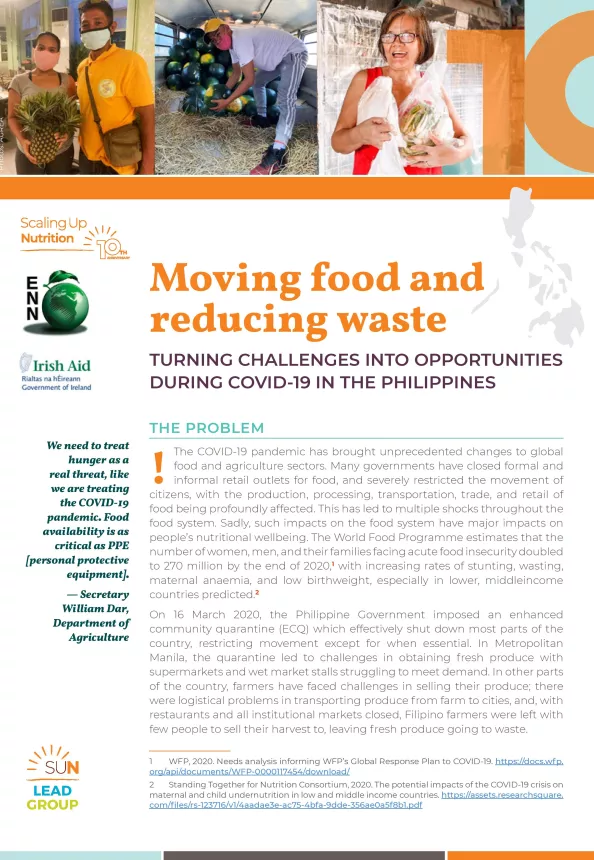Moving food and reducing waste: Turning challenges into opportunities during COVID-19 in the Philippines
Publication details
The Problem
The COVID-19 pandemic has brought unprecedented changes to global food and agriculture sectors. Many governments have closed formal and informal retail outlets for food, and severely restricted the movement of citizens, with the production, processing, transportation, trade, and retail of food being profoundly affected. This has led to multiple shocks throughout the food system. Sadly, such impacts on the food system have major impacts on people's nutritional wellbeing. The World Food Programme estimates that the number of women, men, and their families facing acute food insecurity doubled to 270 million by the end of 2020,1 with increasing rates of stunting, wasting, maternal anaemia, and low birthweight, especially in lower, middleincome countries predicted.2
On 16 March 2020, the Philippine Government imposed an enhanced community quarantine (ECQ) which effectively shut down most parts of the country, restricting movement except for when essential. In Metropolitan Manila, the quarantine led to challenges in obtaining fresh produce with supermarkets and wet market stalls struggling to meet demand. In other parts of the country, farmers have faced challenges in selling their produce; there were logistical problems in transporting produce from farm to cities, and, with restaurants and all institutional markets closed, Filipino farmers were left with few people to sell their harvest to, leaving fresh produce going to waste.
The Solution
AGREA, a group that aims to support the empowerment of local farmers by implementing sustainable agricultural practices and creating inclusive agribusiness livelihood programmes, began getting calls from farmers unable to move their produce. The group, led by Cherrie Atilano, a member of the Scaling Up Nutrition (SUN) Movement Lead Group, quickly set up the Move Food Initiative, an online, Google Formbased, fresh produce ordering platform, which facilitated food to move, at both producers' and consumers' end. The initiative has helped reduce food waste and post-harvest loss on the side of the farmers and on the consumers end, provided people who needed food but were not able to leave their homes because of the quarantine, access to fresh produce.
By 1 June, the day the Philippines began lifting quarantine measures, the initiative had shipped over 160,000 kilograms of fruit and vegetables from more than 7,400 farmers to nearly 52,000 families. By the end of November 2020, 191,447 kg of fruits and vegetables had been delivered, 28,122 farmers had been partnered with, and fruits and vegetables had been served to 78,177 families and 4,690 frontline workers.
The story of the Move Food Initiative offers some insights for other countries who are struggling to ensure that produce moves from farm to consumers, and for whom practical solutions to food waste and postharvest losses are limited. Some key aspects of its success are outlined below.
1 WFP, 2020. Needs analysis informing WFP's Global Response Plan to COVID-19. https://docs.wfp. org/api/documents/WFP-0000117454/download/
2 Standing Together for Nutrition Consortium, 2020. The potential impacts of the COVID-19 crisis on maternal and child undernutrition in low and middle income countries. (PDF) The potential impacts of the COVID-19 crisis on maternal and child undernutrition in low and middle income countries (researchgate.net)

